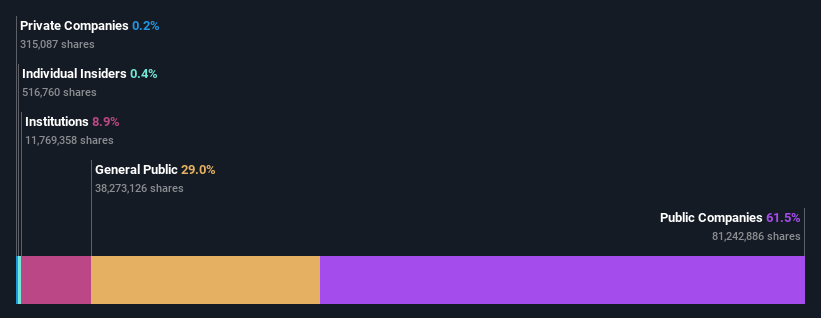REA Group Limited's (ASX:REA) market cap surged AU$642m last week, public companies who have a lot riding on the company were rewarded
To get a sense of who is truly in control of REA Group Limited (ASX:REA), it is important to understand the ownership structure of the business. And the group that holds the biggest piece of the pie are public companies with 61% ownership. Put another way, the group faces the maximum upside potential (or downside risk).
As a result, public companies collectively scored the highest last week as the company hit AU$16b market cap following a 4.3% gain in the stock.
In the chart below, we zoom in on the different ownership groups of REA Group.
Check out our latest analysis for REA Group
What Does The Institutional Ownership Tell Us About REA Group?
Institutions typically measure themselves against a benchmark when reporting to their own investors, so they often become more enthusiastic about a stock once it's included in a major index. We would expect most companies to have some institutions on the register, especially if they are growing.
As you can see, institutional investors have a fair amount of stake in REA Group. This suggests some credibility amongst professional investors. But we can't rely on that fact alone since institutions make bad investments sometimes, just like everyone does. If multiple institutions change their view on a stock at the same time, you could see the share price drop fast. It's therefore worth looking at REA Group's earnings history below. Of course, the future is what really matters.
We note that hedge funds don't have a meaningful investment in REA Group. News Corporation is currently the largest shareholder, with 61% of shares outstanding. This implies that they have majority interest control of the future of the company. For context, the second largest shareholder holds about 1.9% of the shares outstanding, followed by an ownership of 1.2% by the third-largest shareholder.
Researching institutional ownership is a good way to gauge and filter a stock's expected performance. The same can be achieved by studying analyst sentiments. Quite a few analysts cover the stock, so you could look into forecast growth quite easily.
Insider Ownership Of REA Group
The definition of an insider can differ slightly between different countries, but members of the board of directors always count. Company management run the business, but the CEO will answer to the board, even if he or she is a member of it.
Insider ownership is positive when it signals leadership are thinking like the true owners of the company. However, high insider ownership can also give immense power to a small group within the company. This can be negative in some circumstances.
Our most recent data indicates that insiders own less than 1% of REA Group Limited. As it is a large company, we'd only expect insiders to own a small percentage of it. But it's worth noting that they own AU$61m worth of shares. It is good to see board members owning shares, but it might be worth checking if those insiders have been buying.
General Public Ownership
With a 29% ownership, the general public, mostly comprising of individual investors, have some degree of sway over REA Group. This size of ownership, while considerable, may not be enough to change company policy if the decision is not in sync with other large shareholders.
Public Company Ownership
We can see that public companies hold 61% of the REA Group shares on issue. We can't be certain but it is quite possible this is a strategic stake. The businesses may be similar, or work together.
Next Steps:
It's always worth thinking about the different groups who own shares in a company. But to understand REA Group better, we need to consider many other factors. Be aware that REA Group is showing 1 warning sign in our investment analysis , you should know about...
If you would prefer discover what analysts are predicting in terms of future growth, do not miss this free report on analyst forecasts.
NB: Figures in this article are calculated using data from the last twelve months, which refer to the 12-month period ending on the last date of the month the financial statement is dated. This may not be consistent with full year annual report figures.
Have feedback on this article? Concerned about the content? Get in touch with us directly. Alternatively, email editorial-team (at) simplywallst.com.
This article by Simply Wall St is general in nature. We provide commentary based on historical data and analyst forecasts only using an unbiased methodology and our articles are not intended to be financial advice. It does not constitute a recommendation to buy or sell any stock, and does not take account of your objectives, or your financial situation. We aim to bring you long-term focused analysis driven by fundamental data. Note that our analysis may not factor in the latest price-sensitive company announcements or qualitative material. Simply Wall St has no position in any stocks mentioned.
Join A Paid User Research Session
You’ll receive a US$30 Amazon Gift card for 1 hour of your time while helping us build better investing tools for the individual investors like yourself. Sign up here

 Yahoo Finance
Yahoo Finance 

